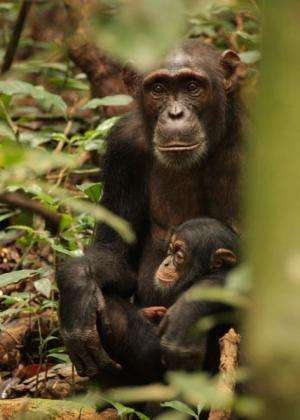Bonobos stay young longer

Despite the fact that chimpanzees and bonobos share similar starting conditions at birth they develop different behavioural patterns later in life. These differences might be caused by different hormone levels. Researchers of the Max Planck Institute for Evolutionary Anthropology in Leipzig, Germany, and the Royal Zoological Society of Antwerp in Belgium have analyzed thyroid hormones from urine samples of zoo-living chimpanzees and bonobos. They discovered that bonobos retain elevated thyroid hormone concentrations well into adulthood, whereas in humans and chimpanzees thyroid hormone concentrations decline after puberty. The late decline of thyroid hormones in bonobos might have consequences on their behaviour and might also indicate a delayed development of their mental capacities.
The thyroid hormones Triiodthyronin (T3) and Thyroxin (T4) influence the ontogenetic development in human and animals. Prenatally, they are responsible for brain and somatic growth as well as for maturation. Later, they influence somatic growth and the emergence of specific developmental stages such as puberty and adulthood. Given the key role of thyroid hormones in the development of all vertebrates, it astonishes that so little is known about thyroid hormones and their impact on the ontogenetic development in our closest living relatives, bonobo and chimpanzee.
While the two species show minor differences in their behaviour during their first years of life, they differ remarkably when they reach adulthood. Male bonobos are less aggressive, engage in lasting friendships with females and receive life-long support from their mothers. In contrast, the social network of male chimpanzees consists of a mixture of male-male cooperation and aggressive behavioural strategies in males that aim on gaining and maintaining high social status. The consequence is that the two sister species live in different social systems.
While some researchers relate this difference in aggression to the dominance relations between females and males, others have suggested that bonobos retain juvenile behaviours until adulthood and – by inference – do not develop the behavioural suite that supports strive for high dominance status of male chimpanzees. In a recent study, scientists of the Max Planck Institute for Evolutionary Anthropology in Leipzig, Germany, and of the Royal Zoological Society of Antwerp in Belgium have investigated hormonal changes in bonobos and chimpanzees. For hormonal analyses, urine samples from around 200 zoo-living individuals ranging between one and 56 years of age were used.

Hormone measures showed that the thyroid hormone pattern of western modern humans and chimpanzees was very similar, with high levels before puberty and a decrease of this hormone during and after puberty. Unexpectedly, samples of bonobos differed: The concentration of thyroid hormone T3 remained high well until adulthood. In other words, compared to chimpanzees, bonobos retain the elevated levels of thyroid hormone which are a characteristic trait for young individuals for a longer time and experience the decline of thyroid hormones relatively late in life. Interestingly, male bonobos were found to have higher thyroid hormone levels than females during their entire life. "Our study showed that male bonobos, who are known for their low levels for aggressive behaviour, had higher thyroid hormone levels than females", says Verena Behringer of the Max Planck Institute for Evolutionary Anthropology. "High thyroid hormone levels likely reduce aggression in male apes." It is likely that female bonobos prefer thyroid hormone "doped" mates.
Moreover, psychological studies indicate that the cognitive development is delayed in bonobos as compared to chimpanzees. It is known that by the age of ten years the growth of a chimpanzee's brain volume and bones has already been finished. The late decline of thyroid hormones in the urine of bonobos might thus show that these animals' mental capacities start developing later in life.
"These are challenging results and we want to find out next, what the biological relevance of the high thyroid levels in bonobos is in detail", says Verena Behringer. "As the thyroid hormone decline in humans is between the one of bonobos and chimpanzees it remains to be seen which of the two species represents the original thyroid rhythm, that is whether the chimpanzee is early ripe or the bonobo a late bloomer."
More information: Verena Behringer, Tobias Deschner, Róisín Murtagh, Jeroen M.G. Stevens, Gottfried Hohmann, Age-related changes in Thyroid hormone levels of bonobos and chimpanzees indicate heterochrony in development, Journal of Human Evolution, DOI: 10.1016/j.jhevol.2013.09.008
Journal information: Journal of Human Evolution
Provided by Max Planck Society

















